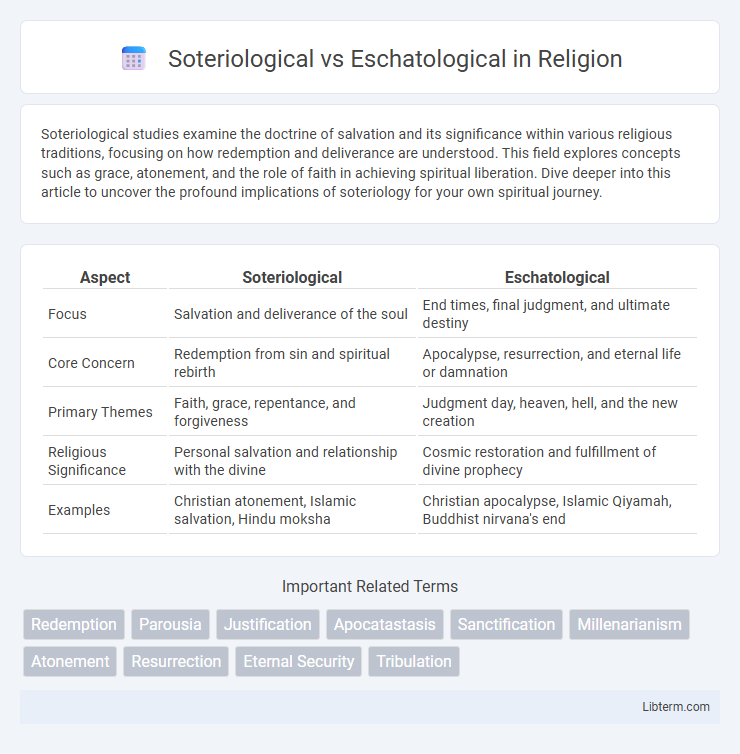Soteriological studies examine the doctrine of salvation and its significance within various religious traditions, focusing on how redemption and deliverance are understood. This field explores concepts such as grace, atonement, and the role of faith in achieving spiritual liberation. Dive deeper into this article to uncover the profound implications of soteriology for your own spiritual journey.
Table of Comparison
| Aspect | Soteriological | Eschatological |
|---|---|---|
| Focus | Salvation and deliverance of the soul | End times, final judgment, and ultimate destiny |
| Core Concern | Redemption from sin and spiritual rebirth | Apocalypse, resurrection, and eternal life or damnation |
| Primary Themes | Faith, grace, repentance, and forgiveness | Judgment day, heaven, hell, and the new creation |
| Religious Significance | Personal salvation and relationship with the divine | Cosmic restoration and fulfillment of divine prophecy |
| Examples | Christian atonement, Islamic salvation, Hindu moksha | Christian apocalypse, Islamic Qiyamah, Buddhist nirvana's end |
Introduction to Soteriology and Eschatology
Soteriology examines the doctrine of salvation, focusing on how individuals attain redemption, forgiveness, and eternal life through divine grace and faith. Eschatology explores the study of end times, including events such as the Second Coming, judgment, resurrection, and the final destiny of souls and the cosmos. Both disciplines are integral to Christian theology, with soteriology addressing the means of salvation and eschatology outlining the ultimate fulfillment of divine promises.
Defining Soteriological Concepts
Soteriological concepts center on the study of salvation and deliverance from sin or spiritual death, emphasizing faith, grace, redemption, and atonement within theological frameworks. Key doctrines include justification by faith, sanctification, and the role of Jesus Christ's sacrifice in restoring the relationship between humanity and the divine. Understanding soteriology involves analyzing how salvation is achieved and its implications for human existence and eternal life.
Understanding Eschatological Frameworks
Eschatological frameworks explore the ultimate destiny of humanity and the world, emphasizing themes such as judgment, resurrection, and the fulfillment of divine prophecy. These frameworks differ from soteriological perspectives, which concentrate on salvation, redemption, and the process of spiritual deliverance. Understanding eschatological frameworks involves analyzing scriptural interpretations, historical contexts, and theological doctrines that shape beliefs about the end times and final cosmic events.
Historical Development of Soteriological Doctrines
The historical development of soteriological doctrines traces back to early Christian debates on salvation, emphasizing the role of divine grace, faith, and works, as seen in Augustine's opposition to Pelagianism and Aquinas's synthesis of faith and reason. Over time, the Reformation introduced a significant shift with Martin Luther advocating justification by faith alone, reshaping Western Christian soteriology. This development contrasts with eschatological teachings that focus primarily on end-times events and final judgment rather than mechanisms of individual salvation.
Eschatology in Religious Traditions
Eschatology, a key branch of theology, addresses the ultimate destiny of humanity and the world, emphasizing concepts like the afterlife, judgment, and the end times across various religious traditions. In Christianity, eschatology includes beliefs in the Second Coming of Christ, resurrection, and final judgment, while in Islam, it highlights the Day of Judgment, paradise, and hell. Hinduism and Buddhism approach eschatological themes through cycles of rebirth and karma, focusing on liberation (moksha or nirvana) rather than a definitive end, contrasting with soteriology's emphasis on salvation and deliverance from sin or suffering.
Key Differences Between Soteriology and Eschatology
Soteriology centers on the study of salvation, exploring how redemption and spiritual deliverance are achieved through divine intervention, faith, and grace. Eschatology examines end-time events, including judgments, the afterlife, and the ultimate destiny of humanity and the cosmos. The key difference lies in soteriology's focus on the process and means of salvation, while eschatology addresses the final outcomes and consummation of history.
Interconnection of Salvation and End Times
Soteriological concepts center on the doctrine of salvation, emphasizing deliverance from sin and spiritual restoration through faith and grace. Eschatological teachings address the end times, including final judgment, resurrection, and the ultimate fulfillment of God's kingdom. The interconnection lies in the belief that salvation (soteriology) prepares believers for the eschaton, where eternal destiny is realized through God's final plan.
Major Debates: Soteriology vs Eschatology
The major debate between soteriology and eschatology centers on the focus of salvation versus end-times events, with soteriology emphasizing the study of salvation, redemption, and human reconciliation with God, while eschatology examines the ultimate destiny of humanity, resurrection, and final judgment. Theological discussions often contrast soteriological questions about grace, atonement, and justification against eschatological themes like the Second Coming, heaven, hell, and the new creation. These debates shape doctrinal interpretations in Christianity, influencing beliefs on how salvation is applied both now and in the future cosmic fulfillment.
Contemporary Implications in Faith and Theology
Soteriological themes emphasize salvation and deliverance, shaping contemporary theological discussions on human redemption and divine grace in modern faith communities. Eschatological perspectives focus on end-times, influencing current beliefs about destiny, judgment, and hope in future fulfillment. The dynamic interplay between soteriology and eschatology informs ethical behavior, worship practices, and the urgency of mission in contemporary Christian theology.
Conclusion: Integrating Soteriological and Eschatological Perspectives
Integrating soteriological and eschatological perspectives enriches theological understanding by linking individual salvation with ultimate destiny, highlighting a comprehensive narrative of redemption and final judgment. This synthesis underscores the transformative journey from present forgiveness and grace to future restoration and eternal life, emphasizing coherence in divine purpose. Recognizing the interplay between salvation (soteriology) and end times (eschatology) fosters a holistic faith framework that grounds hope in both immediate spiritual renewal and ultimate cosmic fulfillment.
Soteriological Infographic

 libterm.com
libterm.com